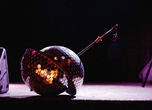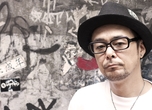Soul Clap: the interview
Eli Goldstein talks EDM, illegal raves and working with George Clinton

Posted: Wed Apr 24 2013
From humble beginnings DJing in the back room at a pop club in Boston, Soul Clap have turned into a globe-trotting disco powerhouse. Whether they're reworking R Kelly and Chris Isaak into slow-burning house anthems, spinning marathon six-hour club sets or cranking out throwback '80s funk productions of their own (check last year's EFUNK The Album), the duo's Charles 'Cnyce' Levine and Eli 'Elyte' Goldstein have barely faltered in their mission to keep things slow, sexy and fun. 'It's always been about keeping music and emotion in dance music,' says Eli when Time Out calls him at home, ahead of Soul Clap's trip to Japan for the Hacienda Oiso Festival 2013 – and only a day after the bombing of the Boston Marathon.
How is it over there? I've been watching the news over the past day or so…
I think it's still sinking in. It's on the news all the time, like everybody's talking about it. I don't think anybody even imagined that they would bomb the Boston Marathon: it's not something that ever crosses your mind, you know? So I'm just drinking some whisky here, and drinking away the pain.
How much time do you spend in Boston at the moment?
I'd moved away from Boston almost four years ago, and was moving around a bunch, but my wife started graduate school here in September, so I moved back. I'm spending all my free time here, but still touring a lot – like, two or three weekends a month on the road.
You're about to release a compilation of Boston artists, Dancing on the Charles. Is it hard to keep track of the local scene when you're spending more time away from it?
Yeah, definitely. There's a lot that goes on when you're actually going out to parties and seeing people. However, a lot of the artists on the comp, I'd stayed in touch with or reconnected with more recently. There's people like Kon and Bosq and Chas Bronz, who are like friends from before – you just stay in touch with them, and continue to hear new music from them.
With the way that Soundcloud and Bandcamp and all these methods of disseminating music online have developed, what kind of effect do you think that's had on the concept of a local scene?
I think Boston is as good an example as any of a very strong, local scene that's focussed on locals, you know? There's still a ton of nights that go on during the week, there's DJs who are working hard, and there's more and more people who are producing here, too. We don't all know each other, but there's pockets for different genres, and there's some cross-pollination. I think that's what you need a local scene for: for collaboration and pushing each other and growing together, and developing a sound that's unique to a city. Sure, you don't have to have that, but I think that's what makes for better music.
Is Boston one of those places that gets left off the circuit, as far as bigger name DJs are concerned?
No, not really. A lot of times, it's week nights that are booking the bigger names: it's people on tour in the States, taking a pay cut to play on a weeknight, when they know that it's going to be a cool party – because the weeknight parties are often pretty awesome. It's definitely a small city, a small scene, and because of all the students here it's very transient: it's hard to build something long-term. There's a lot of turnover.
When I was looking at your bio, the name Caril Mitro came up as a key influence. Could you tell me a bit about him?
Caril's actually a woman...
Oop, sorry. That shows how little I know...
It's fine, I think most people get that one wrong. She was a disco DJ in the late '70s and early '80s in Boston. She would go to New York and bring back records and then play them here, and she knew a lot of New York disco DJs, and then she opened a store called Vinyl Connection with another guy called Tom. She was kind of doing the new stuff, and Tom was this amazing digger, with this ridiculous collection. He could find you pretty much any record you ever needed: it was like Discogs before the internet. So they had this store, Vinyl Connection, for years, and me and Charlie were young ravers who'd been shopping at the other record store, but kept being told to go to Vinyl Connection if we really wanted to find out about house music and disco. They said, "You've gotta be ready, coz they're jerks. It's really hard to get the records you want, because they'll be really mean to you." So we finally got up the balls to go in there, and we went in and started asking questions about disco house, and I guess we asked the right questions, because Caril took a liking to us pretty much right away. She had two stools in front of the cash register, one for chit and one for chat, and we'd sit there and she would just tell us stories. She was really important to our development, and taught us so much about disco and house – and Tom also, about the history of electronic and dance music. It was really a special place.
When you first started playing this stuff out, there weren't many people who were playing it, were there?
Boston has a pretty rich tradition of disco, and New York-style house and disco DJs. There's DJ Kon, who we got to know at Vinyl Connection and was kind of our mentor – he took the ball from Caril, and took us to the next level of understanding about playing disco, and also playing in clubs in Boston. He had a residency at a place called Aria, and we started playing in the back room, and sometimes when there was a bigger DJ booked in the front, he would play in the back with us. He taught us how to mix from hip hop into classics and back and forth again. He's also this amazing disco DJ, and had some underground disco parties. There's a number of DJs like that, and there's also a rich tradition of house in Boston: there'll be bus trips down to Shelter and Body & Soul [in New York], and there's DJs up here. There was a place called The Loft – in the early '90s, before my time – that had DJ Bruno as the main resident, and Armand Van Helden was actually a resident for a while. Bruno is like this Boston deep house don: he owned a store called Biscuit Head Records, and had a night called Utopia on Sundays later on, when we started going out. It was like a dancers' paradise, it was just all house dancing. Bruno was another big influence when it came to house.
There's been a lot of talk in the UK about a house revival recently, but I don't feel like it ever went away in Japan: the old New York guys can still draw a big crowd in Tokyo. Do you feel that when you come here?
Oh, for sure. It's amazing. The crowd is much more diverse, age-wise. In the States and Europe, there's like a lost generation or two in house music. You know what I'm saying? If you think about it, you have the Body & Soul and the Shelter guys, and then Chicago has Derrick Carter and DJ Sneak, and then Luke Solomon and some of the UK jacking-type guys. I can't think of real house DJs between those guys and our generation. Minimal dominated for a while, and house wasn't cool any more. Funky house was so huge in the early 2000s, and then after that it was like: backlash, minimal. So it cycled off, and then finally cycled back, five or so years after that, and that's when we started playing, when we started touring.
When you first started getting known, you said in interviews that you were trying to do what everybody else wasn't doing. Now that there are more people who are receptive to your stuff, does that mean that you have to change direction again?
I think it's been like a constant change of direction. The one thing we've always tried to do is keep evolving. It's just like continuing to push ourselves creatively, so the idea isn't that people come to expect a certain sound from us: it's that they just come to expect the unexpected. I think because we've always played so many different genres of music, we get bored really quickly, too. Also, from the beginning, it's always been about keeping music and emotion in dance music. At that time, it was like a reaction to minimal sucking the emotion and the humanity out of dance music. Continuing to keep the music and emotion in dance music is always our mission. Funk is always important – that's the heart of it, keeping it funky.
You've been putting together a compilation for seminal UK garage label Nice 'N' Ripe recently. Why do you think 2-step never took off in the States, while dubstep has become so massive there?
When it was 2-step, it was amazing. I think it suffered this fate that hip hop and R&B were just so big in America, it didn't need a cousin at the time. Whereas when dubstep was getting big – and now it's become like the biggest thing in the States; what started out as dubstep has become this EDM thing – it was the timing. Hip hop had died, R&B had died, and there was this huge opening for some kind of counter-culture movement becoming mainstream. And also, what people are looking for sonically is different now. Then, it was like warm and sexy and feelgood music, and something about the timing now is: people want darker, more moody and more aggressive music. I think it's like that across the board.
A friend of mine went to see Wolfgang Gartner in Tokyo recently, and he said the dynamic of it was much more like watching a grunge band perform than a DJ...
Totally. From playing some of these festivals in the States now and walking around and watching this stuff, it is a concert. These guys are now like the big rock stars – and there haven't been rock stars like this in a long-ass time, probably since grunge music. I mean, you know: the hip hop guys are big stars, but it's a very different dynamic, going to a hip hop show. This is like massive production, arenas filled with kids jumping up and down and going crazy, and selling out three nights in a row. That's what's happening now in the States, with this EDM thing. It's domination.
They've got Afrojack and some other EDM acts playing at the Hacienda Oiso festival. Do you find that their audience is receptive to what you're doing?
We've found from playing a few festivals in the States now that, because it's a younger audience, I think they're just really receptive to everything. We've got kids hitting us up on Twitter and Facebook saying, "I've never heard of you before, I've never heard music like this before, it was awesome." That kind of thing. With the right billing, getting on the right stages at the right time, I think there's plenty of room for our music to fit in with anything. That's the point of a festival really, right? Artists are sharing their musical story, back to back to back, in a short period of time.
How do you approach doing festival sets? I assume it's rather different from when you're doing six-hour club sets to an audience who've turned up just to see you?
We approach it very differently, actually. When we're playing in clubs, we're playing minimum three-hour sets, so it's much more about seeing what happens, feeling out the crowd. With a festival, you have to get the message across in a really short period of time, so it takes a lot more planning. That's the thing for us: we take more time planning our festival set than actually playing our set. It's not like, "This is the order things are going to go"; it's like me and Charlie getting our heads together and saying, "This is the point we're trying to get across today, and these are the songs that are going to do it." We usually try to get the first track or two – or even three – figured out, just so we can get in there and get comfortable, because you're in front of a lot more people at a festival, so you've got to figure out how to get comfortable right away. And then we have our one folder of music chosen, that we know we're going to be playing to get our message across. Also, at the festival it's really about showcasing our sound and our crew's sound: we play a ton of Wolf + Lamb stuff, stuff from our label, our tracks, special edits, and we'll make sure we play one classic disco song.
Have you learned any tricks in the course of doing your marathon club DJ sets, about how to structure things?
It's definitely all about ups and downs. It's about not being scared of having everybody get bored for a minute and go and get a drink at the bar. And it's definitely all about taking risks – I guess that's the biggest difference between a festival and a club. You don't want to take a risk at a festival in the same way, and that's why you have to plan it, so you're not just going to play the easy stuff. I see so many DJs at festivals where they get in front of the people, and then they just default into whatever they know is going to work, so they're not actually pushing anything musically. With a festival, you have to plan so you're taking a calculated risk, whereas with the club, you can take any risk – you can play a slow jam all of a sudden, and you know the worst that's gonna happen is that people are going to go and have a drink at the bar. And then the people will stay later, because they'll have more energy because they weren't just going crazy the whole time. The clubs are really about peaks and valleys, and playing everything, and surprising people even more – because you take that risk and half the time they're going to be surprised and pissed off, but the other half of the time they're going to be like, "Holy shit, I never thought I would ever hear that song in a club." So that's what's so fun about long sets: it's why I could never really give that one up.
I'm not sure if you've heard about the crackdown on dancing in clubs in Japan, but I was reading that they have something similar in New York with the cabaret laws. Have you had much experience of that yourself?
I've been to clubs in New York where there are signs that say No Dancing.
And everyone just ignores them?
It depends. Sometimes at the party, if everybody gets drunk enough and the party gets crazy enough. But you know what? I've seen it enforced too, where the bouncers will tell people to stop dancing. I don't know if it's like that as much in New York any more – maybe it's like that in Manhattan, but I don't go out or play in Manhattan that much, and if I do, it's at a proper club. In New York, it's like they don't want to give as many licenses for people to have actual nightclubs. There's a lot of underground parties in Brooklyn these days that go until the morning, but they're always in danger of getting busted by the police too.
When you say underground, do you mean places that aren't licensed venues?
Yeah, exactly – like warehouses, lofts, places like that. There's been a lot of that in New York going on over the last ten years.
And do you find those are more fun to play at?
There's a trade-off. It's always a much looser vibe – people are more fucked-up, having more fun – but you're sacrificing sound and comfort. The sound system is never as good as in a club – like a good club system where it's tuned, the DJ booth is right, everything's been taken care of, where you have a good sound guy… You don't get that in a warehouse. You could get a great sound system and a good sound guy, but it's never going to be the same, because it's a one-off and they had to bring it all in there and it's not quite designed for the space. And then, you know, you're going to have gross bathrooms, and you'll probably get a lot of dirt on your shoes, but that makes everything more loose and fun. The best is, Wolf + Lamb has this space in Brooklyn called the Marcy Hotel, which has been going for eight years or so. It's like a club meets an underground space: it's not licensed or anything, and it's a private thing, it's not advertised anywhere, it's just word of mouth – but they've been doing parties there, and they have everything figured out, so it works.
Talking about sound systems, when I interviewed Gilles Peterson a while ago, he said that a lot of clubs now have their sound systems rigged for digital rather than vinyl. Is that something you come across a lot yourselves?
Oh, for sure. Especially in Europe, it's Funktion-One and Allen & Heath domination. It's designed for very punch digital kicks, super compressed and often limited – there's a lot of limiter turned up. The control's been taken away from the DJs, because most DJs don't pay attention to their levels any more, and get red and blow sound systems. And we play vinyl, and it makes it really hard. I don't know if Gilles still plays vinyl and stuff, but I'm sure he's playing a lot of analogue stuff, Serato or whatever, and you really notice the difference. It's fine if you're just playing techno or tech house – like, really digital music, compressed music – but you start noticing it when you're playing old records a lot, and the levels are always fucked up.
Is there anything that you can do to counteract that?
Well, that's one of the advantages of playing long sets – especially starting the night out yourself – because then you can get the levels right. Sometimes, even just switching out the mixer – if they have a rotary or something like that – can make the difference: an analogue mixer, instead of an Allen & Heath. But I guess we like the Pioneer a lot, and that's a digital mixer – it just has some different sound in it, it's a little less geared towards the four-four techno.
One last question: we had George Clinton over here recently with Parliament/Funkadelic, and I understand that you've been working with him. What kind of form has that taken so far?
We're still figuring it out. We were introduced to him by a journalist friend, and got to go down and meet George at the end of last year, and kind of jammed in the studio with him for a while. We have a bunch of projects we started when we were down at his studios in Tallahassee, Florida, but we're still trying to figure out exactly what it's going to be. We have another studio session with him in LA in May, so hopefully we can figure out some more stuff then. I dunno, it's just really fun. Whatever comes of it on a release level, it's been really an amazing experience to get to know George, and kind of be knighted as funketeers, and get a nod that this EFUNK thing that we came up with and have been playing around with is actually accepted by the funk gods.
That must be nice, because I felt like the album got a slightly lukewarm reception in the mainstream dance music press…
Yeah. It's not the best album – I'll admit that – but for us it was the most honest, and the most rewarding to do, on a personal level. And especially now, for it to be signed off on as real funk music – that's really the most important thing for us.
Soul Clap play at The Hacienda Oiso Festival 13, April 27-28. ‘Soul Clap presents Dancing on the Charles: A Boston Electronic Music Story’ is out on May 13. See soulclap.us for details
Tweets
- About Us |
- Work for Time Out |
- Send us info |
- Advertising |
- Mobile edition |
- Terms & Conditions |
- Privacy policy |
- Contact Us
Copyright © 2014 Time Out Tokyo














Add your comment